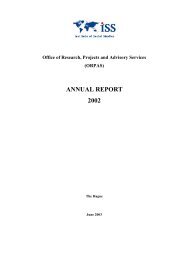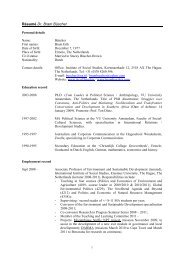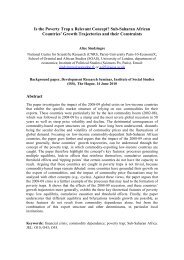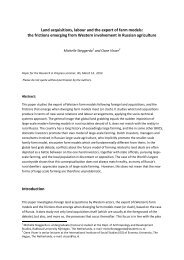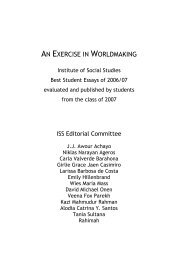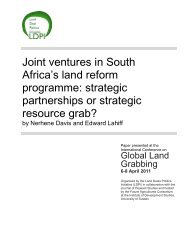AN EXERCISE IN WORLDMAKING 2009 - ISS
AN EXERCISE IN WORLDMAKING 2009 - ISS
AN EXERCISE IN WORLDMAKING 2009 - ISS
Create successful ePaper yourself
Turn your PDF publications into a flip-book with our unique Google optimized e-Paper software.
4 Labour Rights Governance, Decent Work and Global Value Chains 45<br />
In 2006, the Cambodian River-Rich factory dismissed 30 trade union<br />
members and representatives who were in process to form a union to<br />
deal with the company’s abusive use of temporary contracts. In 2007, the<br />
CCADWDU (Coalition of Democratic Cambodian Apparel Workers<br />
Unions) requested the help of the ITGLWF, who had recently developed<br />
the addressed IFA with River Rich’s biggest customer, Inditex. The<br />
agreement stressed the responsibility of the company in ensuring freedom<br />
of association and the right to collective bargaining for its workers,<br />
including those in subcontracting factories. The company went then together<br />
with ITGLWF to Cambodia and negotiated with the factory management<br />
to reinstate the dismissed workers. The management was first<br />
reluctant and several strikes took place during 2007. A second visit was<br />
paid in May 2007 and this time a much better agreement was reached. It<br />
led not only to the reinstatement of the dismissed trade unionists, but<br />
also to the payment of their average salary from the date of their dismissal.<br />
The factory also committed not to discriminate any trade unionist<br />
and to convert the fixed-term contracts into long-term (ITUC, 2008).<br />
Other cases stressed by the Dutch FNV trade union also refer to further<br />
enforcement outcomes of the Inditex IFA. Using the agreement in<br />
the Topy Top factory in Peru and Interstoff in Bangladesh, negotiations<br />
achieved the reinstatement of dismissed trade unionists, the recognition<br />
of unions in the factories, an important increase in trade union membership<br />
and the introduction of industrial relations management systems<br />
and grievance procedures (FNV, 2008).<br />
Notwithstanding these positive outcomes, the IFA has also shown<br />
considerable enforcement limitations. During the last shareholder meeting<br />
of the company in 2008, the Spanish Clean Clothes Campaign<br />
stressed alarming shortcomings of the Inditex outsourcing practices.<br />
More specifically, the campaign focused on the issues of living wages,<br />
labour rights violations, the indemnization of the Spectrum Bangladesh<br />
victims, and the need to address Inditex “just in time” purchasing practices<br />
(El economista, 2008).<br />
The failure to properly address such vital issues with CSR initiatives<br />
even when an international framework agreement has been signed,<br />
shows the need for national regulation for the real enforcement of labour<br />
rights and the ensurement of decent working conditions.<br />
However, as stressed by Gereffi, there is a ‘governance deficit of considerable<br />
magnitude’ in terms of national and international institutions to regu-




